EPR certificate is a mandatory compliance certificate essential for producers, importers, and brand owners PIBOs of electrical and electronic waste, plastic waste, battery waste, and tire waste to manage the disposal of their waste products. It ensures that manufacturers and importers take responsibility for their products after the end of their used lifecycle, which includes recycling and safe disposal, in order to minimize environmental impact.
10000 +
Projects Completed for Our Respected Clients.
15 +
Years Experienced Advisors in Indian Compliance.
98.9%
Project Delivery Ratio for Our Valuable Clients.
99.9%
Satisfied Customers All Over India.
Extended Producer Responsibility (EPR) mandates that producers, importers, brand owners, and manufacturers involved in creating products that contribute to e-waste, plastic waste, battery waste, or tire waste must register for EPR under India’s Extended Producer Responsibility Rules. This registration is necessary to obtain a certificate, which holds them accountable for the waste generated by their products. Rooted in the "polluter pays" principle, the EPR system ensures that these entities contribute to waste reduction efforts and support sustainable development by managing the disposal and recycling of their products.
Manufacturers must get an EPR authorization, eliminate any waste they have created, and report the results to the CPCB annually. As a result of this, the federal and state governments are relieved of some of their burden, as they are no longer concerned with the time and resources that the trash management process will require. If any such organization or individuals who are supposed to take the certificate of EPR and comply with the Extended Producer Responsibility norms do not follow the same, they shall be liable for a fine.
The EPR certificate is approved and issued by the Central Pollution Control Board. It guarantees that waste is collected, transported, treated, stored, disposed of, or recycled in a manner that is safe for the environment and the general population. An EPR certificate also ensures that companies operating in the nation strictly follow the environmental regulations in India. In this approach, companies and the government are both at ease since the government just needs to periodically update the waste management regulatory framework, while businesses are relieved of their concerns over the compliance check.
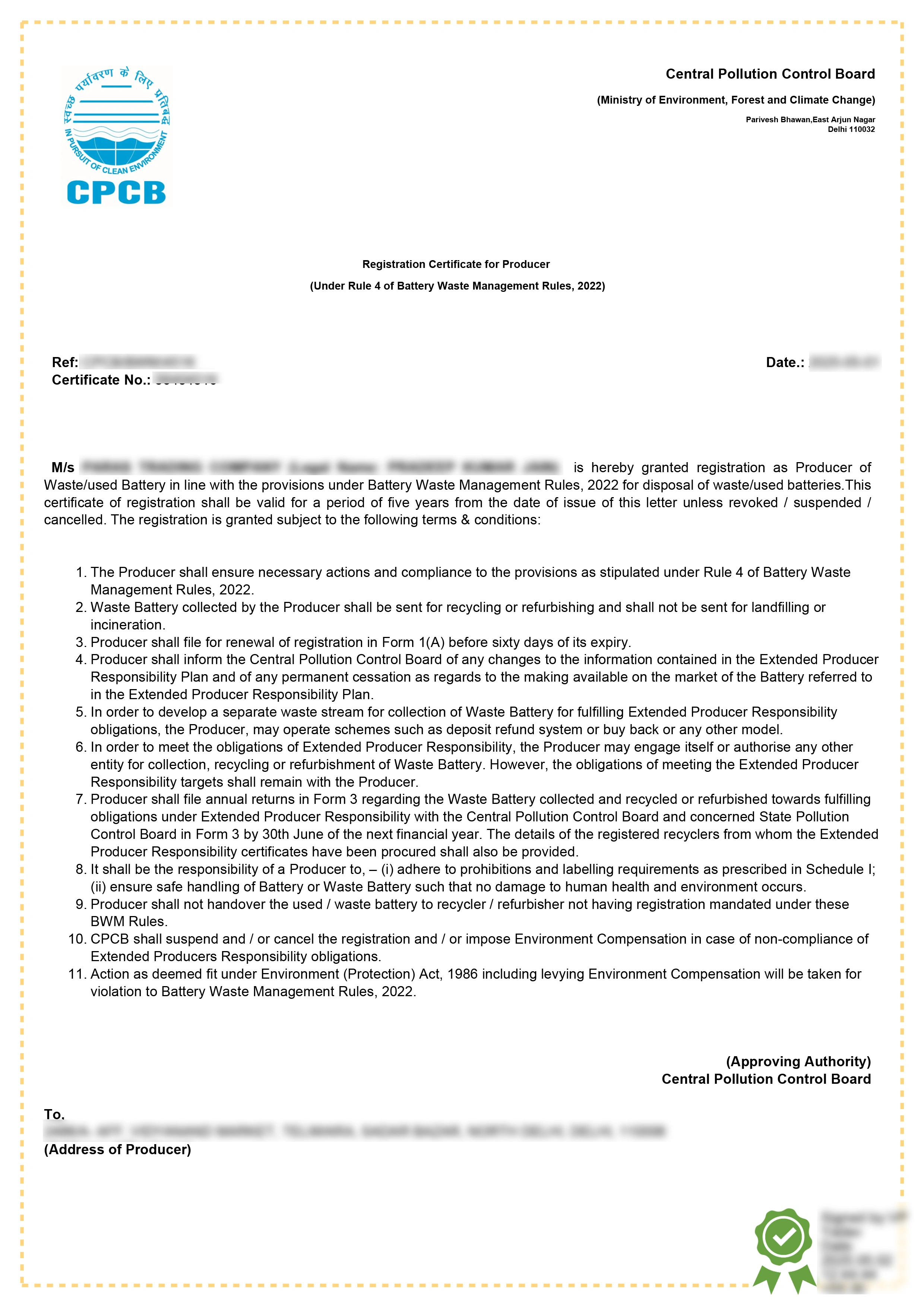
There are now several kinds of waste with unique components that demand different techniques for treating the waste. Due to this, there are differences in the Extended Producer Responsibility laws and regulations pertaining to the types of waste, particularly with regard to e-waste, plastic waste, battery waste, and tire waste.
ERP certification is required by manufacturers or producers, importers, brand owners, and distributors of plastic packaging, batteries, electronic items, and tyres. All such people require an extended producer responsibility certificate from CPCB. Unless they receive an EPR Certificate for plastic waste management from CPCB, PIBOs, and PWPs are not permitted to conduct business.
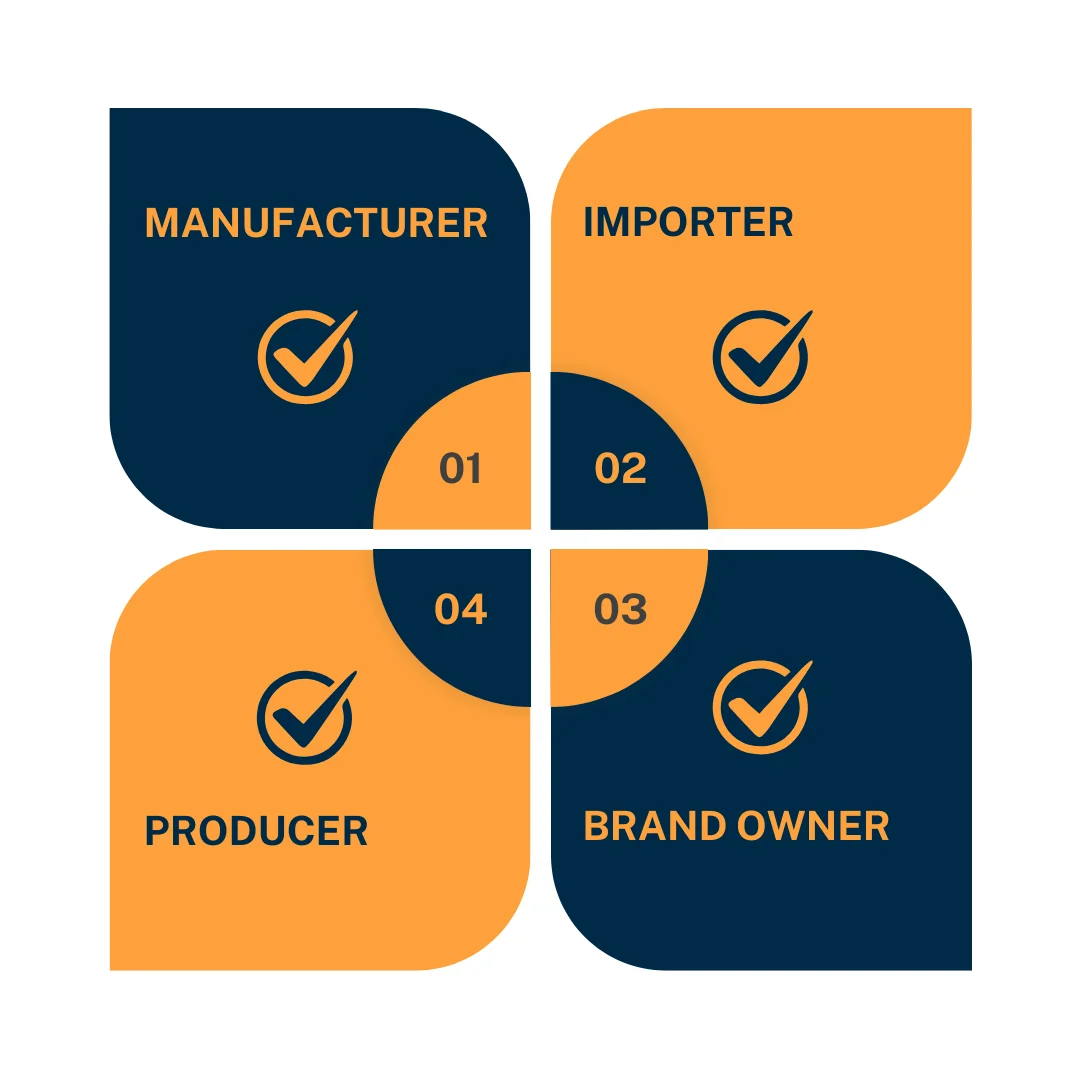
On November 2, 2022, the Ministry of Environment, Forests, and Climate Change released the E-Waste (Management) Rules 2022, which came into effect on April 1, 2023. This rule requires all producers, manufacturers, refurbishers, and recyclers to register on the portal for an EPR certification, gather any e-waste produced during the production, refurbishment, or disposal of any electrical or electronic equipment, and make sure that the trash is recycled or disposed of.
A manufacturer, producer, refurbisher, or recycler are the categories available on the portal of EPR authorization. An entity must register under each category independently if it fits into more than one category. It is prohibited for any organization to conduct business without registration. Depending on the amount of e-waste generated, recycled, or handled by the organization, the Central Pollution Control Board is allowed to impose a fee for annual maintenance along with the registration fees. This is decided by the steering committee and approved by the Central Pollution Control Board.
The Central Pollution Control Board (CPCB), a body of the MoEFCC, Government of India, grants EPR authorization. Entities taking the certificate will have to pay the registration and yearly maintenance costs set by the Central Pollution Control Board in accordance with their ability to handle e-waste, as approved by the steering committee.
As per the latest guidelines, the CPCB issues EPR certificates for producers, importers, and brand owners of electrical and electronic items, plastic packaging, batteries, tyres and oil.
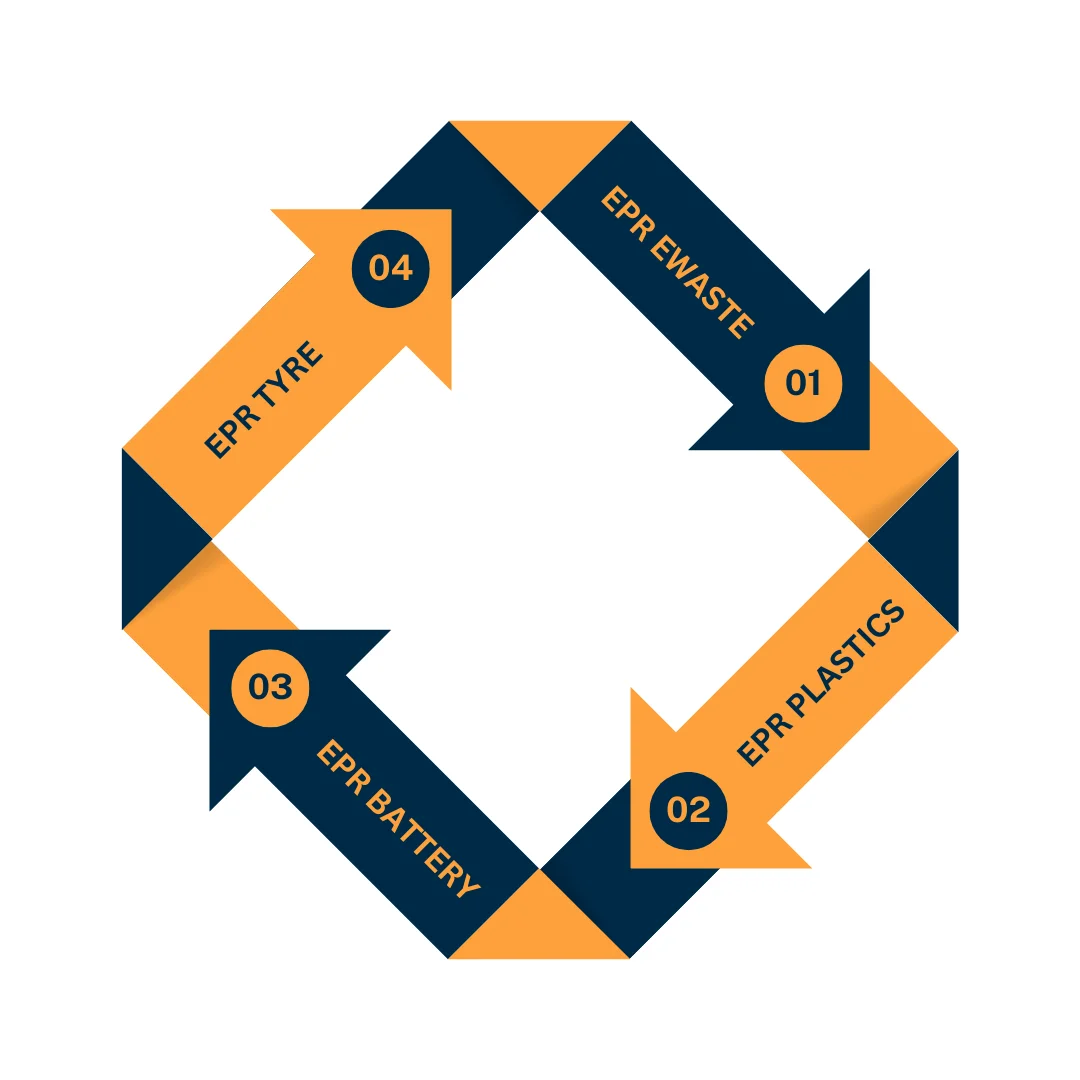
In India, any manufacturer, producer, or importer of electronic and electrical products must obtain an EPR certificate to legally sell their items. This certificate is a key requirement for those involved in e-waste production. The e-waste management regulations were introduced in India in 2011 and updated in 2016 and 2022. The EPR guidelines hold producers, importers, and brand owners (PIBOs) accountable for the full lifecycle of their products, with a primary focus on proper end-of-life disposal. To comply with these rules, producers must partner with certified e-waste recyclers to establish a system for the collection, recycling, and safe disposal of e-waste. The EPR certificate serves as proof that producers meet the legal standards for responsible e-waste management.
All the manufacturers, brand owners, and importers involved in the sale, distribution, or manufacturing of plastic packaging will be required to take the EPR Certification for plastic. The EPR Certificate for plastic waste management is a mandatory certification for producers, importers, and brand owners of plastic items or packaging. This rule was implemented by the government to manage the lifecycle of the plastic products sold in the Indian market. The rule includes responsibility for the collection, recycling, and proper disposal of plastic waste after the end of its lifecycle.
Battery producers, importers, and manufacturers must register their EPRs for battery waste. Batteries require an Extended Producer Responsibility Certificate from both the company manufacturing the batteries and the entity importing batteries or equipment incorporating batteries. All battery types must register for an EPR, regardless of their size, kind, composition, or intended usage.
Any entity that manufactures, sells, or imports tyres is required to register for EPR certification. Certificates have become a vital strategy for managing discarded tyres and mitigating the environmental effects of tyre waste.
It is important to reduce the waste produced in our environment, and therefore, let’s understand the benefits of an EPR Certificate:
✅Making Renewable Products: EPR rules promote treating waste and recycling it. Therefore, this improves products using renewable resources and reduces waste in the environment.
✅Efficient Waste Management: A simplified waste management procedure is guaranteed by an EPR Certificate. It is the responsibility of producers to establish collection methods, work with recycling facilities, and support recycling programs. As a result, there is less garbage going to landfills, better waste segregation, and increased recycling rates.
✅Reduce Waste: The use of the EPR Certificate is one strategy to reduce waste in India.
✅Cost Reduction: Businesses may save money by using EPR certificates. Businesses may reduce trash disposal costs, look into the potential to generate income through recycling, and increase overall operational efficiency by improving waste management processes.
✅Positive Brand Image: Nowadays, customers love environmentally and socially conscious companies. A company's dedication to sustainable business operations and environmental management is demonstrated by its certificate of extended producer responsibility. Businesses may improve their public perception and gain the trust of environmentally concerned customers by registering their products with Extended Producer Responsibility, which will boost their brand loyalty and competitiveness in the market.
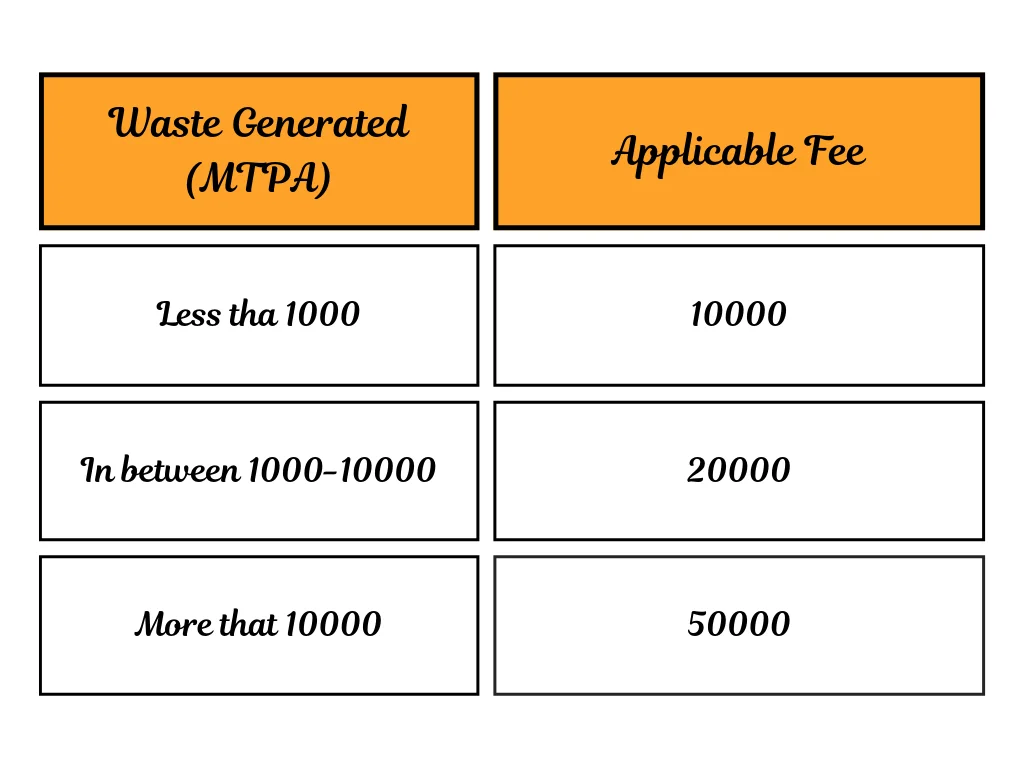
The procedure for obtaining an Extended Producer Responsibility or EPR certificate may vary based on the particular laws in your area. Generally, the following steps are involved in getting a certificat:
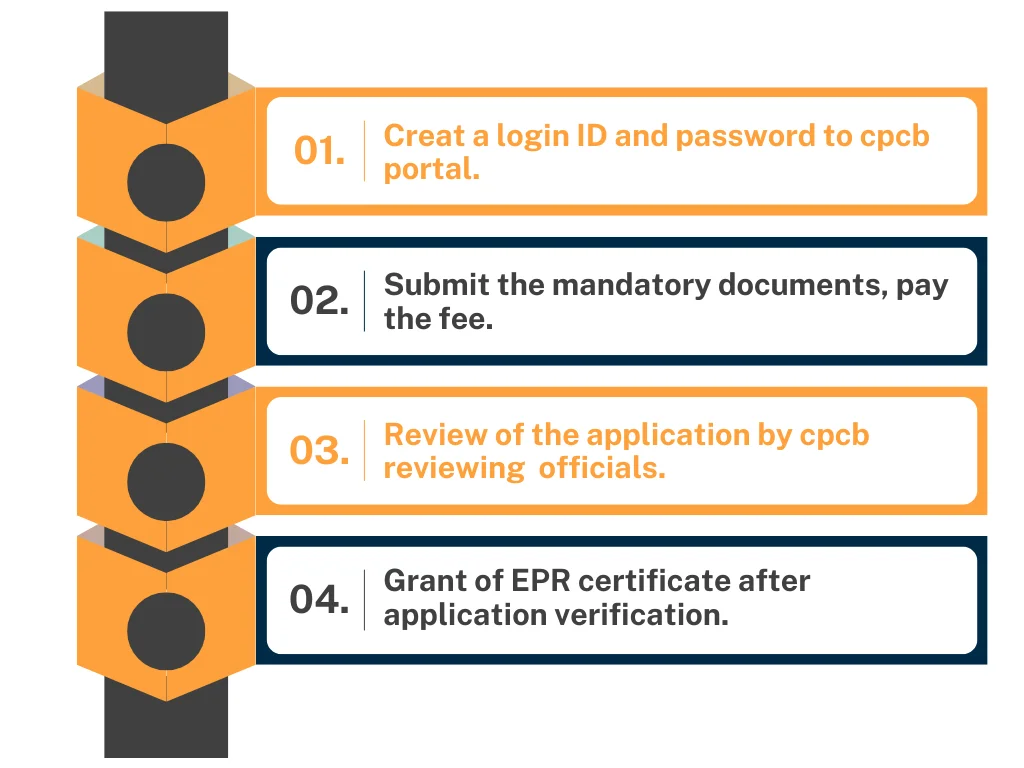
✅Check Eligibility: Verify if the Extended Producer Responsibility laws apply to your company. Determine if you are the owner of the brand or the producer, manufacturer, importer, or owner of goods subject to EPR.
✅Compile the required information: Gather all the data needed to submit an application for an EPR certificate. This might contain information about your company, the kinds and amounts of goods you manufacture or import, and your waste management strategies.
✅Fill out the application form: Complete the application form for a certificate as provided by the regulatory authority. Give precise and thorough facts about your company, goods, waste management strategies, and any other pertinent information.
✅Provide mandatory documents: These might include declarations of compliance, waste management plans, financial responsibility documentation, product information, and business registration paperwork.
✅Submit the application: Fill out the application form and submit it with the required documents to the relevant authority. Whether submitting online, by mail, or in person, make sure you follow the rules and regulations.
✅Issue of EPR Certificate: The certificate will be issued if your application has been approved. This certificate ensures your responsibility towards waste management practices and your compliance with Extended Producer Responsibility laws.
You can rely on Agile Regulatory to complete your application forms for the CPCB EPR Certificate on time. Our consultants for Extended Producer Responsibility certificates are dedicated to helping you with the paperwork and assessment procedure. Moreover, we will stay in close contact with CPCB representatives to ensure prompt follow-ups and acknowledgements and that all relevant records and data are ready as per the CPCB's request.
We try hard to respond to any unforeseen requests or questions from the CPCB so that your registration is completed on time. To surpass your expectations, we dedicate our efforts to completing all necessary requirements. At last, our team also provides answers to all of your questions about Extended Producer Responsibility authorization certificates.
In India, producers, importers, and brand owners of electronic equipment or plastic packaging are required to manage their goods responsibly at the end of their lifecycles. This is known as Extended Producer Responsibility Authorization or EPR Certificate.
By receiving the EPR certification, companies show their commitment to use sustainable practices and contribute to the environment.
Brand owners of MSME Micro and Small Category are free from complying with the EPR regulations. Regardless of whether they are an MSME or not, producers and importers must adhere to the Plastic EPR regulations.
The entire registration procedure might take up to thirty days. In order to avoid fines or cancellation, producers must meet their EPR objectives on time.
The EPR certificate once issued is valid for a valid of 5 years. After that, it can be renewed
You need to file an application in form-1 for renewal within sixty days of the expiration date.
To apply for an EPR certificate, visit the specific EPR portal for plastic, e-waste, battery, and tyre waste. The registration process for Extended Producer Responsibility (EPR) involves submitting an application form to the Central Pollution Control Board (CPCB). The CPCB will assess the application and may ask for further details if required. Once everything is in order, the CPCB will issue the certificate.
EPR Certificate full form is Extended Producer Responsibility. It is a system where producers, importers, and brand owners are responsible for the collection, recycling, and disposal of their products at the end of life.
Proven 4-step Process: Consultation, Documentation, Submission, and Certification.
Startups to large enterprises, we deliver end-to-end solutions business compliance needs.

What our customer says about us
Fantastic support from the team. Their expertise transformed our approach, driving remarkable outcomes. A must-have partner for businesses seeking effective consulting solutions. Highly recommended.

Lavkush Sharma
KTPL Instruments
Agile Regualtory delivers exceptional solutions. Their insightful guidance streamlined our processes and boosted profitability. Highly recommended for businesses seeking expert consulting services to thrive.

Nitin Mukesh
Justrack IOT
Impressed by Agile Regulatory's expertise. Their strategic insights and practical solutions have elevated our business operations. A reliable partner for effective consulting services. Highly recommended for growth-focused businesses.

Pradeep Varma
Coaire Compressor
Extraordinary consulting services. Their insightful solutions and dedicated team reshaped our business, driving remarkable improvements. Highly recommend it for transformative results.

Bharat Bachwani
Easy Polymer
Incredible experience with Agile Regulatory. Their innovative strategies and expert advice revitalized our business model, resulting in impressive growth. Highly recommend their exceptional consulting services.

Atul Jain
Tarus International
Top-tier consulting! offered strategic solutions that revolutionized our approach. Their deep expertise and personalized guidance made a significant impact on our success. Highly recommend their services.

Paramjeet Singh
Anchor Weighing
Agile Regulatory exceeded expectations! Their tailored solutions, expertise, and proactive approach led to remarkable results. Highly recommend for businesses seeking impactful and strategic guidance.

Anshul Rathi
AM Capacitor
Outstanding service! delivered targeted solutions with professionalism and expertise. Their insights elevated our business strategies, resulting in noticeable growth. Highly recommended for exceptional consultation.

Shekhar Maurya
Imaxx Pro Aquistic